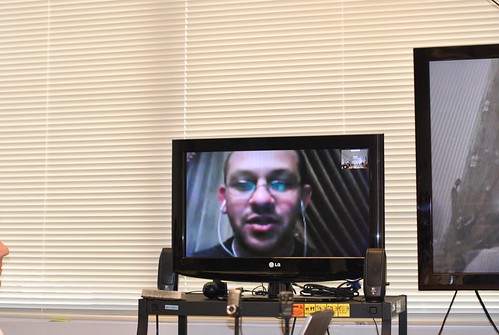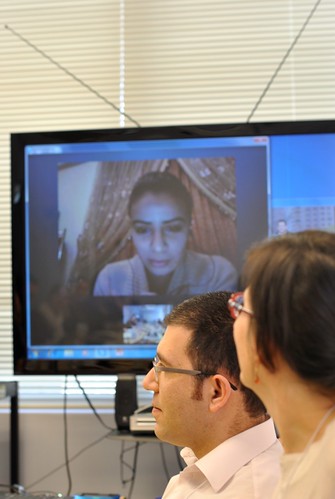This third and final post shares some insights from the planning sessions for E-Mediat project, a networked approach to capacity building for NGOs in Social Media in the Middle East. (For context, read my first post about this project.) The highlight of third day was a VIP Lunch with project sponsors, implementation team, and remote participation via skype from members of the In-Country teams in Jordan and Morocco.
Trish Tierney, Executive Director of IIE from the West Coast Center welcomed us. Next, Heather Ramsey from IIE and Kit Bartels, MEPI, US Department of State shared a high level overview of the project. I was impressed with how they both synthesized and incorporated feedback from our planning meetings into their overviews. Listening, responding, and being flexibly are qualities that I observed being modeled throughout the three days of planning from project leaders – an important networked leadership skill. I got to introduce myself and my role in the project, but the most valuable part of the meeting was briefing on social media and activism.
Mary Joyce, who is an expert on digital activism and will be delivering a training on that topic, gave us an overview of how social media is being used for activism around the world. She identifies four categories and gave examples for each. The categories included Insiders, Entrants, Persuaders, and Usurpers.
Jessica Dheere and Mohamad Najem from SMEX Beirut gave an overview of Social Media use in Lebanon. As Mohamad pointed out, most of the users of social media are using it for social reasons and only a small percentage by “terrorists” or political activism. What struck me were the points that they shared from NGOs in their country and later reported on their blog with contextual links:
That, since these companies determine in many ways how we use the Web, they should play an active role in demanding and defending freedom of expression for all.
That we should lobby the US government to restrict US companies from selling the filtering and monitoring software that many oppressive regimes use to track and then detain bloggers and other online activists.
Not to ghettoize the Arab world. That is, not to think of it as apart from the rest or the West but as integrated and with knowledge flowing in both directions.
To augment efforts to increase the amount of Arabic-language content online by making it easier to use and read Arabic online. (Arabic speakers account for 65 million users and are one of the fastest growing segments of the Web.)
On the lighter side, they shared a brief video by @Naeema and @sdarine about why people Tweet in their country and who want to throw a party when Arabic Twitter comes to town. Check out the full report on the SMEX blog and share your thoughts in comments.

Rami Al-Karmi, Founder and CEO of Shabakat, Al Ordon (JordanNet) and who is serving as the E-Mediat Strategic Advisor for Jordan gave an overview of Social Media use in his country also mentioning the lack of research on Arabic usage. He shared a couple of inspiring stories about NGOs use of Social Media, including an organization with an Arabic name that translates into “Speak Up.” The organization used social media as part of an outreach strategy to 250,000 to encourage them to register to vote. They had impressive results.
He also mentioned that many of the Government’s Ministers are on Facebook or Twitter and that he communicates directly with them through social networks which is very beneficial. He also mentioned the very popular “Tech Tuesdays” in Jordan where Arab social media geeks meet up regularly. His organization’s name, Shabakat, translates into the word “network,” and perhaps is a terrific example of a Networked Nonprofit in the Arab world …

Widad El Hanafi, Country Director in Morocco gave an overview of the challenges faced by NGOS in her country and social media use. She noted that the sector was not as developed due to lack of training, language, and resources. There is a huge language barrier because a lot of training materials are in English. A big capacity issue is skills training in communications and journalism because without this training, they can’t provide accurate information and it makes it difficult for NGOs.
There has been a lot of adoption of social media, particularly in the areas of entertainment. There are over 1 million people on Facebook in her country. It’s still low given the 35 million people in Morocco. She also pointed out that there is a dearth of concrete information and studies about social media use there. She said that social media can have a huge potential impact for NGOS to raise awareness of the programs, communicate with larger audiences, and communicate about their programs and goals and recruit volunteers. She has seen this in a mentoring program for women engineers.

Leave a Reply